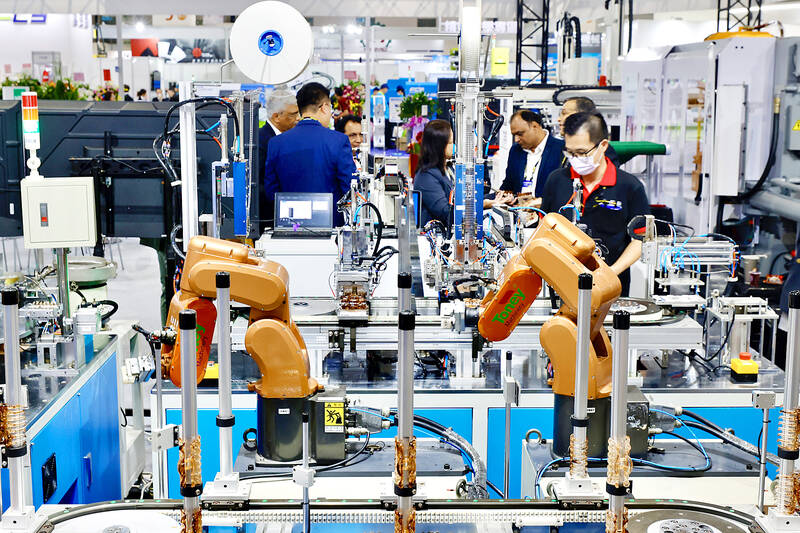Taiwan’s economy might grow 3.8 percent this year amid robust external demand, but might only gain 1.7 percent next year, as key export drivers such as chips are losing steam, Moody’s Analytics said yesterday.
The Asia-Pacific region, including Taiwan, is outpacing most of the world’s economies with regional GDP growth expected to average 3.9 percent this year and 4 percent next year, faster than expected global GDP growth of 2.6 percent and 2.7 percent respectively, the research body said.
However, economic conditions within the region vary widely, it said.

Photo: Ritchie B. Tongo, EPA-EFE
Taiwan has enjoyed robust growth in exports thanks to the rise of artificial intelligence (AI), which has fueled demand for advanced semiconductors, it said.
Taiwan’s exports in the first eight months of this year expanded 10.9 percent year-on-year to US$308.57 billion, thanks to demand for electronics used in cloud-based data centers and the development of AI applications, government data showed.
The AI boom has not lifted Southeast Asia, which mainly produces low to mid-tier chips. Trade has played a key driver of growth for much of the region, but its impact has been uneven, Moody’s Analytics said.
Nevertheless, external demand in the region has been treading water due to slowing US growth and Europe’s stalled economy, it said.
Specifically, growth in global chip billings has decreased in the past few months, suggesting that shipments of tech products would decline, with no guarantee that domestic demand would offset the drop, Moody’s Analytics said.
At the same time, consumer prices are cooling in the region despite intermittent hiccups linked to bad weathers, it said, as is the case with Taiwan.
Moody's Analytics said that inflation is mostly in line with central bank targets even though risks are still skewed toward inflation overshooting rather than undershooting.
Food prices are jumpy and energy prices hover above pre-pandemic averages, it said, noting that a flare-up in commodity prices could stoke inflation and fuel monetary tightening.
Taiwan’s central bank last week left key policy rates intact, but hiked the required reserve ratio and stiffened lending terms to rein in the housing market, at odds with a rate cut by the US Federal Reserve to support the economy.
Meanwhile, elections in the US and Europe would further complicate the growth outlook, it said.
Potential shifts in US economic policy following the presidential election in November are a major concern, as US exports drive growth for much of the region, it said, adding that economies heavily dependent on strong US ties would be most affected.
The US has grown into Taiwan’s second-largest export destination due to a rapid increase in shipments of AI-related electronics.
Moody’s Analytics expects regional currencies to appreciate going forward after the US Federal Reserve cut interest rates by 50 basis points last week and its median projections suggest more cuts of 50 basis points toward the end of this year.

The US dollar was trading at NT$29.7 at 10am today on the Taipei Foreign Exchange, as the New Taiwan dollar gained NT$1.364 from the previous close last week. The NT dollar continued to rise today, after surging 3.07 percent on Friday. After opening at NT$30.91, the NT dollar gained more than NT$1 in just 15 minutes, briefly passing the NT$30 mark. Before the US Department of the Treasury's semi-annual currency report came out, expectations that the NT dollar would keep rising were already building. The NT dollar on Friday closed at NT$31.064, up by NT$0.953 — a 3.07 percent single-day gain. Today,

‘SHORT TERM’: The local currency would likely remain strong in the near term, driven by anticipated US trade pressure, capital inflows and expectations of a US Fed rate cut The US dollar is expected to fall below NT$30 in the near term, as traders anticipate increased pressure from Washington for Taiwan to allow the New Taiwan dollar to appreciate, Cathay United Bank (國泰世華銀行) chief economist Lin Chi-chao (林啟超) said. Following a sharp drop in the greenback against the NT dollar on Friday, Lin told the Central News Agency that the local currency is likely to remain strong in the short term, driven in part by market psychology surrounding anticipated US policy pressure. On Friday, the US dollar fell NT$0.953, or 3.07 percent, closing at NT$31.064 — its lowest level since Jan.

The New Taiwan dollar and Taiwanese stocks surged on signs that trade tensions between the world’s top two economies might start easing and as US tech earnings boosted the outlook of the nation’s semiconductor exports. The NT dollar strengthened as much as 3.8 percent versus the US dollar to 30.815, the biggest intraday gain since January 2011, closing at NT$31.064. The benchmark TAIEX jumped 2.73 percent to outperform the region’s equity gauges. Outlook for global trade improved after China said it is assessing possible trade talks with the US, providing a boost for the nation’s currency and shares. As the NT dollar

PRESSURE EXPECTED: The appreciation of the NT dollar reflected expectations that Washington would press Taiwan to boost its currency against the US dollar, dealers said Taiwan’s export-oriented semiconductor and auto part manufacturers are expecting their margins to be affected by large foreign exchange losses as the New Taiwan dollar continued to appreciate sharply against the US dollar yesterday. Among major semiconductor manufacturers, ASE Technology Holding Co (日月光), the world’s largest integrated circuit (IC) packaging and testing services provider, said that whenever the NT dollar rises NT$1 against the greenback, its gross margin is cut by about 1.5 percent. The NT dollar traded as strong as NT$29.59 per US dollar before trimming gains to close NT$0.919, or 2.96 percent, higher at NT$30.145 yesterday in Taipei trading